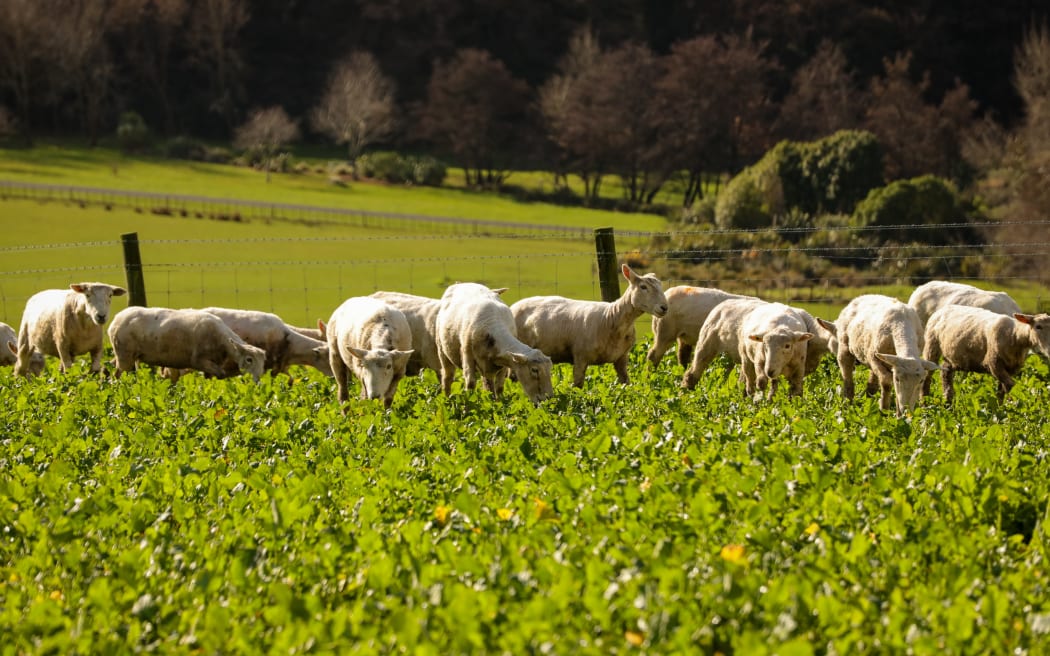Sheep farmers cutting costs, looking for new income sources as prices plummet

The news keeps getting worse for the country’s sheep farmers. Export prices are 30 percent down on two years ago, while on-farm costs have climbed 20 percent.
Many RNZ has spoken to say no sheep farmers will be making money this year – and prominent Wairarapa sheep farmer Roger Barton said with all the media attention on public service job cuts in Wellington, people have forgotten jobs are going in regional centres too.
It was frustrating that people had no idea how terrible it was for farming communities, Barton said.
“The thing in the rural community, at the end of the day it might just be one to two people not going up someone’s drive for work that day, whereas it’s far more graphic in Wellington where MPI (Ministry for Primary Industries) or whatever, MBIE (Ministry of Business, Innovation and Employment), have just canned a reasonable chunk of workforce who won’t be walking out their door at the end of the day.
“Looks quite graphic when you’ve got 50 people not walking out a door.
“But actually in the regional economy these people are adding real value. I always, unfortunately, look at Wellington like a bit of a vortex sucking cash out of the rest of the economy.”
Barton said there were three Fs in farming at present, – feed costs and financial strain (interest rates) were two of them, the other an expletive.
“It’s a major crisis.”
Farmers were cutting costs where possible, but some costs – like rates – could not be, Barton said. He quoted his South Wairarapa District Council rates, which were due to increase 15.3 percent. His insurance bill had jumped four-fold in eight years.
He said they had spent time pruning the $12,000 insurance bill back by nearly $1000 by not insuring some things and being prepared to take a bigger hit on other items.
The cuts had to come from farm input, and that was “good for no one”.
“I’m aware of one business where there’s $120,000 of lime and fertiliser that won’t be going on. And that’s just maintenance – we’re not talking about increasing production, we’re just talking about maintaining.
“And the same farm still ends up with an $88,000 deficit. They’re circa 8000 stock units, so bigger than your average New Zealand farm, but similar to many Wairarapa eastern hill country properties. So there’s some pretty serious deficits looming.”
This lack of cash flowed through to contracting businesses in rural towns, and they were probably hurting even more, he said.
“People who do fertiliser cartage, they’re just about devoid of work at the moment. People who spray gorse, my guys came in and did what had to be done, but they didn’t do all of what they should have done, so they’re probably on this farm 40 percent shy of what they’d have normally done. And that will be common, so there’s a lot less work in the rural community.”

ANZ economist Susan Kilsby agreed very few, if any, sheep farmers would be in surplus this year. The Chinese market, which was where most of New Zealand’s mutton and half its lamb production went, was weak.
“It’s looking challenging for the lamb sector and the mutton sector. We’re not really expecting any improvement in international prices in the next 12 months or so, so cash flows are likely to deteriorate even further over that time. Some people are finding it hard to see the light at the end of the tunnel.”
There was a big slowdown in tractor sales and fertiliser use, while repairs and maintenance were being deferred, Kilsby said.
“We’re certainly seeing the impact of that in some of our rural areas, the confidence has just dropped considerably, more than in other parts of the country.”
Rural Support Trust national head Neil Bateup said there had been a noticeable increase in calls from sheep farmers wanting financial advice, compared to other pastoral groups.
“We are seeing some cases come through for business advice help that we run in conjunction with the banks, and a lot of those at the moment are coming from the sheep sector.”
For 45 years, Otago farmer David Botting enjoyed his sheep and beef property. But this year was grim, “not the toughest ever, but one of the toughest”. That was not helped by three years of drought, he said.
He knew of farmers working off-farm to make the books balance.
“We’re really scratching our heads to see how we can innovate, what changes we can make to the business to generate more income.”
He and some other farmers even got into sending wool to China to make jerseys and carpets so they could see if it was possible to make money, and looked into whether others in the supply chain were taking money farmers could be making.
In 1990, wool returns made up about a third of a sheep and beef farmer’s income – now shearing was a cost.
“The wool industry is in dire straits. In the late 1980s, we were getting $7 a kilo … today we’re lucky to get $2 a kilo.”
According to the news on Radio New Zealand




